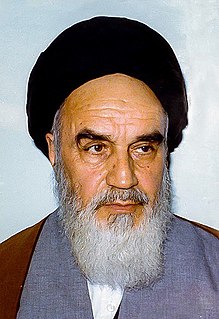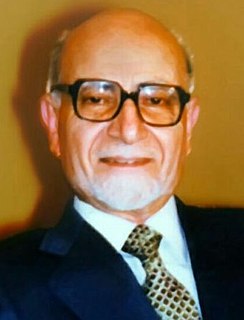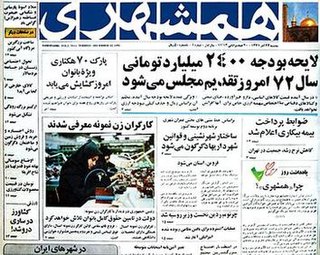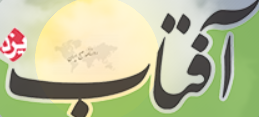Related Research Articles

Sayyid Ruhollah Musavi Khomeini, also known as Ayatollah Khomeini, was an Iranian political and religious leader who served as the first supreme leader of Iran from 1979 until his death in 1989. He was the founder of the Islamic Republic of Iran and the leader of the 1979 Iranian Revolution, which saw the overthrow of Shah Mohammad Reza Pahlavi and the end of the Persian monarchy. Following the revolution, Khomeini became the country's first supreme leader, a position created in the constitution of the Islamic Republic as the highest-ranking political and religious authority of the nation, which he held until his death. Most of his period in power was taken up by the Iran–Iraq War of 1980–1988. He was succeeded by Ali Khamenei on 4 June 1989.

Sir Ahmed Salman Rushdie is an Indian-born British-American novelist and essayist. His work, combining magical realism with historical fiction, is primarily concerned with the many connections, disruptions, and migrations between Eastern and Western civilizations, with much of his fiction being set on the Indian subcontinent.

Ebrahim Yazdi was an Iranian politician, pharmacist, and diplomat who served as deputy prime minister and minister of foreign affairs in the interim government of Mehdi Bazargan, until his resignation in November 1979, in protest at the Iran hostage crisis. From 1995 until 2017, he headed the Freedom Movement of Iran. Yazdi was also a trained cancer researcher.

Mehdi Bazargan was an Iranian scholar, academic, long-time pro-democracy activist and head of Iran's interim government. He was appointed prime minister in February 1979 by Ayatollah Khomeini, making him Iran's first prime minister after the Iranian Revolution of 1979. He resigned his position in November of the same year, in protest at the US Embassy takeover and as an acknowledgement of his government's failure in preventing it.

Liberalism in Iran or Iranian liberalism is a political ideology that traces its beginnings to the 20th century.

Kayhan is a newspaper published in Tehran, Iran. It is considered "the most conservative Iranian newspaper." Hossein Shariatmadari is the editor-in-chief of Kayhan. According to the report of the New York Times in 2007, his official position is representative of the Supreme Leader of Iran.

Hamshahri is a major national Iranian Persian-language newspaper.
Iran is a constitutional, Islamic theocracy. Its official religion is the doctrine of the Twelver Jaafari School. Iran's law against blasphemy derives from Sharia. Blasphemers are usually charged with "spreading corruption on earth", or mofsed-e-filarz, which can also be applied to criminal or political crimes. The law against blasphemy complements laws against criticizing the Islamic regime, insulting Islam, and publishing materials that deviate from Islamic standards.

Ettela'at is a Persian language daily newspaper of record published in Iran. It is among the oldest publications in the country, and the oldest running Persian daily newspaper in the world. The paper has a conservative stance and focuses on political, cultural, social and economic news. Until the revolution of 1979, the newspaper was associated with its chief founder Abbas Massoudi (1895-1974).
Ham-Mihan was a reformist daily newspaper in Tehran, Iran. It was in circulation between 2000 and 2009.

The Satanic Verses controversy, also known as the Rushdie Affair, was the heated reaction of some Muslims to the publication of Salman Rushdie's novel The Satanic Verses, in the United Kingdom in 1988, which was inspired in part by the life of Muhammad. Many Muslims accused Rushdie of blasphemy or unbelief and in 1989 the Ayatollah Ruhollah Khomeini of Iran issued a fatwa ordering Muslims to kill Rushdie. Numerous killings, attempted killings, and bombings resulted in response to the novel.

Aftab-e Yazd is a Persian-language daily reformist newspaper published in Tehran, Iran. The title of the paper means “the sun of Yazd” in Persian.

Resalat is a conservative daily newspaper in Iran. It is a pro-Khamenei and pro-Ahmadinejad newspaper.

Iran is the official daily newspaper of the government of Iran.
Neshat was a reformist and moderate Persian language newspaper published in Iran and headquartered in Tehran. The paper was founded in 1998 and published until 2005 when it was banned by the Iranian authorities.
Salam was a Persian newspaper published in Tehran, Iran. The name of the paper was given by Ahmad Khomeini, Ayatollah Khomeini's son. It was highly influential in the country during its brief existence from 1991 to 1999 and was one of the early reformist dailies published following the Islamic revolution in Iran.

Ebtekar is a Persian-language newspaper published in Tehran, Iran.

Mojahed is the official newspaper of the People's Mujahedin of Iran (MEK), first printed in 1979 on a weekly basis. The newspaper published its last issue inside Iran on 30 June 1981 and after a hiatus resumed publication in exile on 2 December 1982.

Qanun was a Persian language newspaper which was published in London during the period 1890–1898. The founder and editor of the paper was Mirza Malkam Khan who served as the Qajar Iran's envoy to Britain and Italy. It is known to be the first oppositional publication of Iran and was one of the publications which improved the political awareness of Iranians.
References
- ↑ Joel Thierstein; Yahya R. Kamalipour (2000). Religion, Law, and Freedom: A Global Perspective. Greenwood Publishing Group. p. 60. ISBN 978-0-275-96452-8.
- ↑ Naiim Bapii (1995). "Content characteristics of major Iranian newspapers: a comparative analysis of six Tehran dailies". CEMOTI, Cahiers d'Études sur la Méditerranée Orientale et le monde Turco-Iranien. 20 (20): 49. doi:10.3406/cemot.1995.1274.
- 1 2 Anthony Hyman (1990). "Iran's press — freedom within limits". Index on Censorship. 19 (2): 26. doi:10.1080/03064229008534794. S2CID 143865652.
- ↑ "Iranian Newspaper Rejects Rushdie's Conciliation Effort". The New York Times. AP. 26 December 1990. Retrieved 25 September 2013.
- 1 2 "The Political Affiliations of Iranian Newspapers" (PDF). ASL19. 2013. Archived from the original (PDF) on 28 September 2013. Retrieved 25 September 2013.
- ↑ "Rushdie's Death Sentence Stands, Iran Says". Los Angeles Times. Athens. UPI. 27 December 1990. Retrieved 6 September 2014.
- ↑ David Menashri (January 2001). Post-revolutionary Politics in Iran: Religion, Society, and Power. Psychology Press. p. 326. ISBN 978-0-7146-5074-6.
- ↑ Abdolrasoul Jowkar; Fereshteh Didegah (2010). "Evaluating Iranian newspapers' web sites using correspondence analysis". Library Hi Tech. 28 (1): 119–130. doi:10.1108/07378831011026733.
- ↑ "Abrar". Iran Media Program. Archived from the original on 13 December 2013. Retrieved 7 December 2013.
- ↑ Joanna Paraszczuk (9 June 2013). "Abrar Newspaper Raided, Suspended". EA Worldview. Retrieved 6 September 2014.